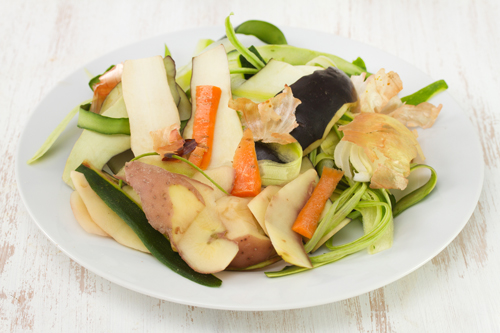Save time and reduce food waste
Conduct a Food Waste Audit
We think a rebranding is in order for the humble Food Waste Audit.
 Afterall, who would voluntarily conduct an audit?! Since this is the industry term, we will do our best to get the Ends+Stems community behind it. We will however, update the process and make it fun!
Afterall, who would voluntarily conduct an audit?! Since this is the industry term, we will do our best to get the Ends+Stems community behind it. We will however, update the process and make it fun!
It’s hard to measure food waste on a microscale
The problem with household food waste is that its very hard to measure on the microscale of the individual home. There are plenty of data and studies to tell us that 40% of all food produced is wasted; or that 67% of the we waste at home is edible. We know that the average family of 4 is throwing out upwards of $2100 worth of food annually. However, few of us can say how much WE are wasting, why we wasted it, or which foods are most commonly going to waste.
It’s easy to overlook what goes in the trash
It’s easy to overlook what goes in the trash especially if you have multiple people in your household. A little bit here and a little more there really adds up. The food waste audit is similar to a food journal. For 1 week, you and your family/housemates will keep track of everything that goes into the trash. Afterwards, you have a powerful starting point to make simple changes to the household norms and routine.
Convinced? Let’s get started!
Food Waste Audit Plan

Pick a “typical week” – ideally you want a 7 day stretch with nothing out of the ordinary, like a holiday, going on (Events are good. Have meetings, soccer practice and a babysitter? All fair game!) It doesn’t have to be perfect though, just commit.

Print the sheet, or make your own on a chalkboard or other surface near the main kitchen trash can. It’s tempting to go digital but you need something everyone can use and that lives near the trash/compost bin. Attach a pen to the chart.

Explain the rules to everyone in your house who’s old enough to use a pen:
- Every time you put food in the trash/compost write it down here
- Name of the food
- Estimate the amount (I prefer cups, handfuls, etc. something that is visual and intuitive)
- Don’t make any changes to your normal habits yet!
- Do your best to keep it up for a week
Things to keep in mind:
We're only counting edible waste. That sounds like an oxymoron, because we definitely aren’t asking you to eat trash (ever. That’s not the food waste reform ends+stems is promoting). Measure the banana fruit (not the peel), eggs (not the eggshells), the leftovers, half apples (not the cores), half a glass of milk, the dregs of the tortilla chip bag, etc.
If something is slimy, bad, or rotten, that DOES count! (It wasn't rotten 3 days ago, right? That's food waste).
Notate WHY the food is getting tossed out. Look for the root cause.
The financial piece is optional. It can be challenging for those who don’t do the shopping or aren’t overly concerned about what they spend on food to track the financial aspect. But, if you're here to rack up that 2k in annual savings, adding the dollar estimate to the audit is incredibly motivating.
Make a collage
The food waste audit is about seeing the edible waste your house produces so you can alter your habits going forward. Writing it down is the classic way to do this and it does give invaluable insights like the name of the dish and detailed notes on your thought process.
In addition to the list, we recommend a photo diary. When you make an entry, snap a photo of what you’re tossing out. At the end of the week, pile all of your snapshots into our free Canva Template.
You’ll end up with an incredibly powerful visual and clear data on how food is wasted in your home.
Conclusions
When your audit is complete it’s time to look for patterns. Ideally, have the whole household gather round and strike up a conversation about what you see. Are there similar entries - either in ingredient type or reasons something was wasted? What is the total amount wasted? Was there a day of the week that was more or less wasteful? If yes, does it have anything to do with the day you grocery shopped or your work schedules? How does everyone feel when they look at the photo collage?
Try to suss out some patterns and family conclusions. Have each household member write down between 1 and 3 goals in their personal habits to reduce food waste in the next few weeks. What can each person commit to?
Want more?
Still here? Ends+Stems is laying the groundwork to conduct the first study to measure how much less food you waste when meal planning. “Meal Plan and Grocery Shop From a List” is our business thesis and its also the most common advice given by food waste experts to home cooks. But no one has ever studied HOW well it works. Our only proof is anecdotal from raving fans.
Want to do more? Send us an email at hello@endsandstems.com with the subject line “Food Waste Audit” to be part of this inaugural study that will truly change how we act for the planet.


